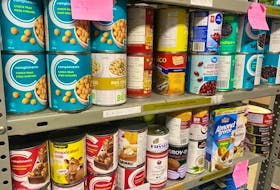It is almost all Vivian Williams has left of a turbulent time in her life, and is a reminder of the role Canadians – even children – played during the Second World War on the homefront.
A junior commando
It was 1942. The war had been raging for more than two years and the U.S. had just entered the battle on the side of the Allies.
She was just a little girl, but eight-year-old Vivian wanted to help.
At the time, she was living in Yarmouth with her mother. Her father was working in Labrador.
Determined to assist in the war effort, she became a junior commando -part of a squad of young people who collected metal that could be reused in the war effort.
And metal she found.
Vivian recalls people in her neighborhood in Yarmouth’s north end giving her old pots and pans they were no longer using and digging out much more discarded metal from backyard dump sites. The iron, aluminum and brass gathered was taken to a collection centre, where she and other junior commandos were told it would be turned into ships, tanks and planes to fight the war with.
And the youngster knew what was going on. The war was all around her. The high-pitched whine of air raid sirens outside her bedroom window still resonates in her memories.
“It would go off and we would have to have the blinds pulled quickly,” she recalls.
She remembers with pride wearing the special armband – complete with stripes – she was given as a junior commando. She also recalls winning a drawing contest that year and accepting her prize, a Little Orphan Annie embroidery kit at the CJLS office.
It was from Little Orphan Annie comic books that the idea of junior commandos was first introduced. In the comic, Annie organized the group with her friends. The idea caught on across the U.S, and Canada and soon there were thousands of real junior commandos collecting metal, newspapers and other recyclable items for the war effort.
A family moves home
A year later, Vivian would leave Yarmouth to return to Sable River with her mother, where the war continued to touch her life.
Her much-loved uncle, M. Gordon Giffin, left with the Canadian Army for the battlefields of Europe. The family would receive a tersely worded telegram only months later that he was seriously wounded – shot in the chest by a sniper during the battle for France. He returned to Shelburne County at the war’s end with injuries that would plague him for the rest of his life.
Vivian grew up to become a nurse, serving in hospitals as well as nursing homes in Shelburne and Lockeport. She would later also care for her uncle, who lived until he was 90.
The war, so many years ago, is usually far from her thoughts today.
But when sorting through old boxes, if a carefully stored armband – its proud letter and stripes still clear – falls out, the memories still flood back.
It is almost all Vivian Williams has left of a turbulent time in her life, and is a reminder of the role Canadians – even children – played during the Second World War on the homefront.
A junior commando
It was 1942. The war had been raging for more than two years and the U.S. had just entered the battle on the side of the Allies.
She was just a little girl, but eight-year-old Vivian wanted to help.
At the time, she was living in Yarmouth with her mother. Her father was working in Labrador.
Determined to assist in the war effort, she became a junior commando -part of a squad of young people who collected metal that could be reused in the war effort.
And metal she found.
Vivian recalls people in her neighborhood in Yarmouth’s north end giving her old pots and pans they were no longer using and digging out much more discarded metal from backyard dump sites. The iron, aluminum and brass gathered was taken to a collection centre, where she and other junior commandos were told it would be turned into ships, tanks and planes to fight the war with.
And the youngster knew what was going on. The war was all around her. The high-pitched whine of air raid sirens outside her bedroom window still resonates in her memories.
“It would go off and we would have to have the blinds pulled quickly,” she recalls.
She remembers with pride wearing the special armband – complete with stripes – she was given as a junior commando. She also recalls winning a drawing contest that year and accepting her prize, a Little Orphan Annie embroidery kit at the CJLS office.
It was from Little Orphan Annie comic books that the idea of junior commandos was first introduced. In the comic, Annie organized the group with her friends. The idea caught on across the U.S, and Canada and soon there were thousands of real junior commandos collecting metal, newspapers and other recyclable items for the war effort.
A family moves home
A year later, Vivian would leave Yarmouth to return to Sable River with her mother, where the war continued to touch her life.
Her much-loved uncle, M. Gordon Giffin, left with the Canadian Army for the battlefields of Europe. The family would receive a tersely worded telegram only months later that he was seriously wounded – shot in the chest by a sniper during the battle for France. He returned to Shelburne County at the war’s end with injuries that would plague him for the rest of his life.
Vivian grew up to become a nurse, serving in hospitals as well as nursing homes in Shelburne and Lockeport. She would later also care for her uncle, who lived until he was 90.
The war, so many years ago, is usually far from her thoughts today.
But when sorting through old boxes, if a carefully stored armband – its proud letter and stripes still clear – falls out, the memories still flood back.









